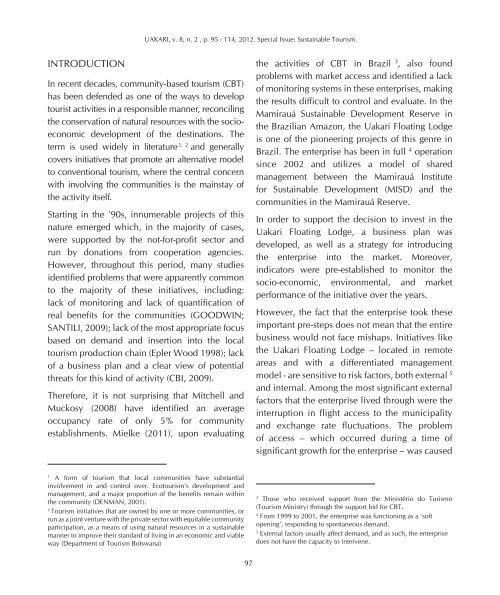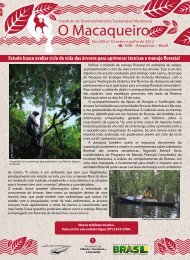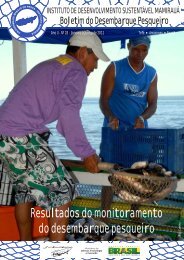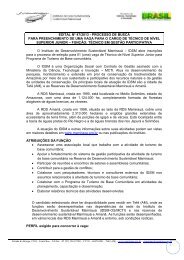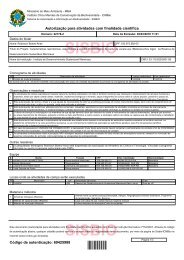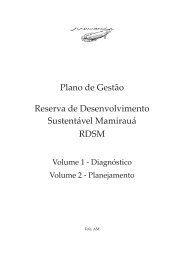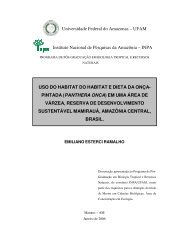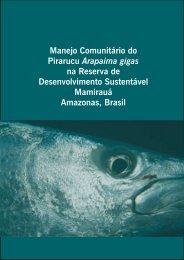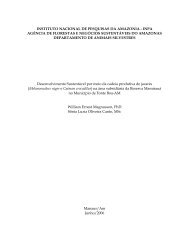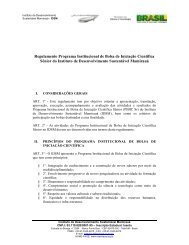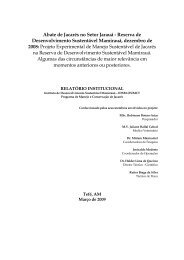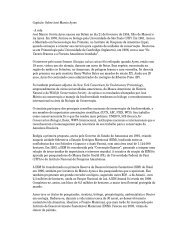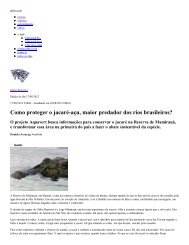<strong>UAKARI</strong>, v. 8, n. 2 , p. 95 - 114, 2012. Special Issue: Sustainable Tourism.INTRODUCTIONIn recent <strong>de</strong>ca<strong>de</strong>s, community-based tourism (CBT)has been <strong>de</strong>fen<strong>de</strong>d as one of the ways to <strong>de</strong>veloptourist activities in a responsible manner, reconcilingthe conservation of natural resources with the socioeconomic<strong>de</strong>velopment of the <strong>de</strong>stinations. Theterm is used wi<strong>de</strong>ly in literature ,1, 2 and generallycovers initiatives that promote an alternative mo<strong>de</strong>lto conventional tourism, where the central concernwith involving the communities is the mainstay ofthe activity itself.Starting in the ’90s, innumerable projects of thisnature emerged which, in the majority of cases,were supported by the not-for-profit sector andrun by donations from cooperation agencies.However, throughout this period, many studiesi<strong>de</strong>ntified problems that were apparently commonto the majority of these initiatives, including:lack of monitoring and lack of quantification ofreal benefits for the communities (GOODWIN;SANTILI, 2009); lack of the most appropriate focusbased on <strong>de</strong>mand and insertion into the localtourism production chain (Epler Wood 1998); lackof a business plan and a clear view of potentialthreats for this kind of activity (CBI, 2009).Therefore, it is not surprising that Mitchell andMuckosy (2008) have i<strong>de</strong>ntified an averageoccupancy rate of only 5% for communityestablishments. Mielke (2011), upon evaluatingthe activities of CBT in Brazil 3 , also foundproblems with market access and i<strong>de</strong>ntified a lackof monitoring systems in these enterprises, makingthe results difficult to control and evaluate. In theMamirauá Sustainable Development Reserve inthe Brazilian Amazon, the Uakari Floating Lodgeis one of the pioneering projects of this genre inBrazil. The enterprise has been in full 4 operationsince 2002 and utilizes a mo<strong>de</strong>l of sharedmanagement between the Mamirauá Institutefor Sustainable Development (MISD) and thecommunities in the Mamirauá Reserve.In or<strong>de</strong>r to support the <strong>de</strong>cision to invest in theUakari Floating Lodge, a business plan was<strong>de</strong>veloped, as well as a strategy for introducingthe enterprise into the market. Moreover,indicators were pre-established to monitor thesocio-economic, environmental, and marketperformance of the initiative over the years.However, the fact that the enterprise took theseimportant pre-steps does not mean that the entirebusiness would not face mishaps. Initiatives likethe Uakari Floating Lodge – located in remoteareas and with a differentiated managementmo<strong>de</strong>l - are sensitive to risk factors, both external 5and internal. Among the most significant externalfactors that the enterprise lived through were theinterruption in flight access to the municipalityand exchange rate fluctuations. The problemof access – which occurred during a time ofsignificant growth for the enterprise – was caused1A form of tourism that local communities have substantialinvolvement in and control over. Ecotourism’s <strong>de</strong>velopment andmanagement, and a major proportion of the benefits remain withinthe community (DENMAN, 2001).2Tourism initiatives that are owned by one or more communities, orrun as a joint venture with the private sector with equitable communityparticipation, as a means of using natural resources in a sustainablemanner to improve their standard of living in an economic and viableway (Department of Tourism Botswana)3Those who received support from the Ministério do Turismo(Tourism Ministry) through the support bid for CBT.4From 1999 to 2001, the enterprise was functioning as a ‘softopening’, responding to spontaneous <strong>de</strong>mand.5External factors usually affect <strong>de</strong>mand, and as such, the enterprisedoes not have the capacity to intervene.97
OZORIO, R. Z.; JANÉR, A. Community-Based Ecotourism in the Mamirauá Reserve.by the closure of the Tefé 6 municipal airport,resulting in a significant <strong>de</strong>crease in <strong>de</strong>mand andthus compromising the enterprise’s cash flow.The exchange rate, with its large fluctuations, wasalso a significant risk factor since it resulted in anovervaluation of the Brazilian Real – turning Brazilinto an expensive international long distance<strong>de</strong>stination – and negatively impacting <strong>de</strong>mandfor the enterprise. Equally, managerial <strong>de</strong>cisionswere ma<strong>de</strong> that adjusted the price of the productin inopportune moments, creating risks of aninternal nature.The purpose of this study is to share lessons learnedand to contribute to the discussion regarding theperformance of CBT initiatives. This documentevaluates the results of the Uakari Floating Lodgeduring the period between 2002 and 2010, byanalyzing the quality of the product (from theperspective of the visitor) and by measuringthe economic and financial performance of theenterprise. Moreover, the evaluation attemptsto measure the impact of certain risk factors oninitiatives of this nature, as well as to generatereflections regarding intangible benefits associatedwith enterprises with similar characteristics.MATERIAL AND METHODSEvaluation of product quality (point of view ofthe ecotourist)In or<strong>de</strong>r to evaluate the quality of ecotourismservices, data was analyzed from the period2002 to 2011, collected using a questionnairethat is filled out by guests of the enterprise andwhich inclu<strong>de</strong>s multiple choice and open-en<strong>de</strong>dquestions. The principal indicators evaluated were:food, transportation, lodging, activities, gui<strong>de</strong>s,information availability, cleanliness and an overallevaluation of the visit. The visitors qualified theservices mentioned using a scale of 1 through 5,where: 1 is terrible; 2 is normal; 3 is good; 4 isvery good and 5 is excellent.The questionnaire also collects qualitativeinformation, using a space reserved for suggestions,criticisms and/or complaints. To analyze thisinformation, the comments from the period 2009to 2011 were grouped and categorized accordingto operating sector.With the objective of comparing the quality ofthe services offered by the Uakari Floating Lodgeto other competing initiatives in the ecotourismmarket (Pan-Amazon and Pantanal), queries werema<strong>de</strong> to the site tripadvisor.com. Tripadvisor.com is a site that helps visitors searching forinformation about travelling. It is the largestsite of its genre in the world, with more than 60million hits per month 7 . On this site, visitors canmake in<strong>de</strong>pen<strong>de</strong>nt and voluntary evaluations 8 ofthe <strong>de</strong>stinations they have visited and participatein discussion forums. With these evaluations,the <strong>de</strong>stinations receive a grading that allowsinterested travelers to make comparisons betweenthe places they want to visit.Tripadvisor is a very highly used tool and isuseful for not only visitors themselves but for themanagers of the enterprises evaluated, since anevaluation written after a trip has been taken tendsto have more <strong>de</strong>tails than an evaluation done6The garbage dump located near the airport was putting airplanetakeoffs and landings at risk due to the presence of vultures. So, forsecurity reasons, the airport was closed for nine months.7For more information about the site: www.tripadvisor.com/pages/about_us.html.8Visitors evaluate the following criteria: price, cleanliness, services,location, rooms and sleep quality.98
- Page 1 and 2:
ISSN 1981-450XUAKARIv.8 n.2 dez. 20
- Page 3 and 4:
AddressInstituto de Desenvolvimento
- Page 5 and 6:
Journal was designed with the goal
- Page 7:
ASSESSING THE MARKET FOR ECOTOURISM
- Page 10 and 11:
JaNéR, A. Assessing the Market for
- Page 14 and 15:
JaNéR, A. Assessing the Market for
- Page 16 and 17:
JaNéR, A. Assessing the Market for
- Page 18 and 19:
JaNéR, A. Assessing the Market for
- Page 21 and 22:
UAKARI, v. 8, n. 2 , p. 7 - 25, 201
- Page 23 and 24:
UAKARI, v. 8, n. 2 , p. 7 - 25, 201
- Page 25 and 26:
UAKARI, v. 8, n. 2 , p. 7 - 25, 201
- Page 27 and 28:
ENVIRONMENTAL IMPACT ASSESSMENT OF
- Page 29 and 30:
UAKARI, v. 8, n. 2 , p. 29 - 42, 20
- Page 31 and 32:
UAKARI, v. 8, n. 2 , p. 29 - 42, 20
- Page 33 and 34:
UAKARI, v. 8, n. 2 , p. 29 - 42, 20
- Page 35 and 36:
UAKARI, v. 8, n. 2 , p. 29 - 42, 20
- Page 37 and 38:
UAKARI, v. 8, n. 2 , p. 29 - 42, 20
- Page 39 and 40:
UAKARI, v. 8, n. 2 , p. 29 - 42, 20
- Page 41 and 42:
DOES ECOTOURISM ACTIVITY AFFECT PRI
- Page 43 and 44: UAKARI, v. 8, n. 2 , p. 43 - 50, 20
- Page 45 and 46: UAKARI, v. 8, n. 2 , p. 43 - 50, 20
- Page 47 and 48: UAKARI, v. 8, n. 2 , p. 43 - 50, 20
- Page 49 and 50: BIRDWATCHING IN THE MAMIRAUÁ LAKE
- Page 51 and 52: UAKARI, v. 8, n. 2 , p. 51 - 66, 20
- Page 53 and 54: UAKARI, v. 8, n. 2 , p. 51 - 66, 20
- Page 55 and 56: UAKARI, v. 8, n. 2 , p. 51 - 66, 20
- Page 57 and 58: UAKARI, v. 8, n. 2 , p. 51 - 66, 20
- Page 59 and 60: UAKARI, v. 8, n. 2 , p. 51 - 66, 20
- Page 61 and 62: UAKARI, v. 8, n. 2 , p. 51 - 66, 20
- Page 63 and 64: UAKARI, v. 8, n. 2 , p. 51 - 66, 20
- Page 65 and 66: REPERCUSSIONS OF THE 2010 EXTREME D
- Page 67 and 68: UAKARI, v. 8, n. 2 , p. 67 - 74, 20
- Page 69 and 70: UAKARI, v. 8, n. 2 , p. 67 - 74, 20
- Page 71 and 72: UAKARI, v. 8, n. 2 , p. 67 - 74, 20
- Page 73 and 74: ECOTOURISM AS AN INCENTIVE TO BIODI
- Page 75 and 76: UAKARI, v. 8, n. 2 , p. 75 - 94, 20
- Page 77 and 78: UAKARI, v. 8, n. 2 , p. 75 - 94, 20
- Page 79 and 80: UAKARI, v. 8, n. 2 , p. 75 - 94, 20
- Page 81 and 82: UAKARI, v. 8, n. 2 , p. 75 - 94, 20
- Page 83 and 84: UAKARI, v. 8, n. 2 , p. 75 - 94, 20
- Page 85 and 86: UAKARI, v. 8, n. 2 , p. 75 - 94, 20
- Page 87 and 88: UAKARI, v. 8, n. 2 , p. 75 - 94, 20
- Page 89 and 90: UAKARI, v. 8, n. 2 , p. 75 - 94, 20
- Page 91 and 92: UAKARI, v. 8, n. 2 , p. 75 - 94, 20
- Page 93: OZORIO, R. Z.; JANÉR, A. Community
- Page 97 and 98: OZORIO, R. Z.; JANÉR, A. Community
- Page 99 and 100: OZORIO, R. Z.; JANÉR, A. Community
- Page 101 and 102: OZORIO, R. Z.; JANÉR, A. Community
- Page 103 and 104: OZORIO, R. Z.; JANÉR, A. Community
- Page 105 and 106: OZORIO, R. Z.; JANÉR, A. Community
- Page 107 and 108: OZORIO, R. Z.; JANÉR, A. Community
- Page 109 and 110: OZORIO, R. Z.; JANÉR, A. Community
- Page 111 and 112: OZORIO, R. Z.; JANÉR, A. Community
- Page 113 and 114: UAKARI - Guidelines for publication
- Page 115 and 116: UAKARI - Guidelines for publication
- Page 117 and 118: UAKARI - Guidelines for publication
- Page 119 and 120: UAKARI - Guidelines for publication
- Page 121: Editorial 3 - 4Review ArticlesAsses


